
Biden’s Broadband Program Costs $42B
July 17, 2023
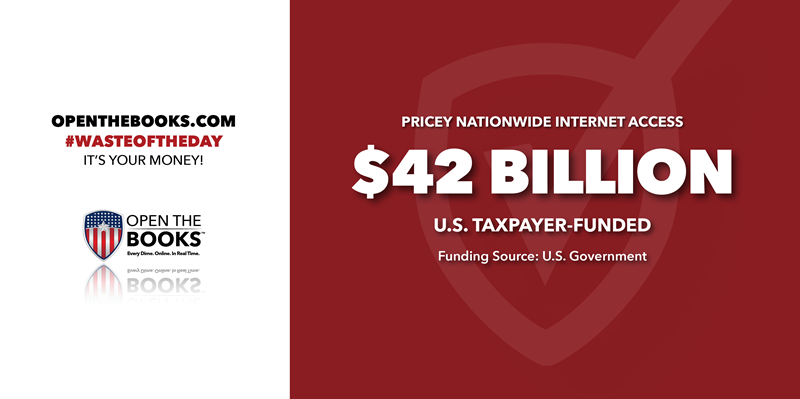
President Joe Biden championed a new $42 billion investment in broadband connectivity, The Washington Post reported, pitching the project as providing broadband to underserved rural areas. Wealthy, urban areas are also cashing in.
The Post reported the investment helps an estimated 8.5 million people access high speed internet, especially in rural communities, and works out to an investment of about $4,941 per person. Biden said his plan would help bridge the “digital divide” in communities that can’t access high speed internet.
The funding comes thanks to the Broadband Equity Access and Deployment program created by the bipartisan infrastructure law.
Per the Washington Post map, Connecticut will receive $144 million, while North Dakota will only receive $130 million. Maine is set to receive $272 million, while Wyoming only gets $207 million.
Massive states with large urban populations are receiving large payments. California is set to receive $1.86 billion, though Texas is the ultimate winner with a gaudy $3.31 billion. This is while many of the Great Plains states, with presumably high rural populations, are mainly slated for sums under $500 million.
Programs like this have historically been riddled with waste and inefficiency. Kentucky tried overhauling its broadband in 2010, but by 2019, ProPublica called the project “Kentucky’s $1.5 billion Information Highway to Nowhere” and described how it was $100 million over budget and behind schedule.
NYC Wasted $9M on Trashed Surveys
July 18, 2023
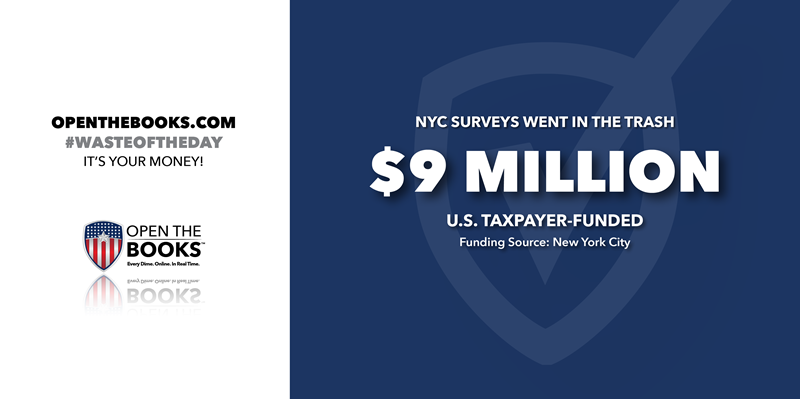
New York City spent $8.8 million sending out mental health surveys to residents, along with $5 bills. Most of the surveys were thrown away, The New York Post reported.
The packages look like junk mail, and most likely were tossed in the trash — along with the cold, hard cash.
The New York City Health Department worked with the City University of New York to sponsor the survey, including $5 bills as an incentive to fill out the surveys. Ipsos, a research firm, was paid $7.5 million to conduct the survey.
The envelopes containing the surveys and money bore a note saying that residents could receive $20, the reward for completing the survey, but there was no mention of any money inside.
The surveys were sent to over 210,000 households, but only about 13,000 were completed and returned, about 6%. Sending $5 to each participant cost about over $1 million, and shelling out another $20 for each response cost an additional $260,000. Including the $7.5 million paid to Ipsos, the total cost of this botched survey program was about $8.8 million.
Of course, NYC could have avoided some of this waste by sending checks which would not have cost the city money if they were thrown away without being cashed.
Additionally, giving out a total of $25 to everyone that was sent the surveys could have cost a total of $5.25 million, an absurd amount to give away to complete a survey. This is especially true considering New York City’s dire budget deficit projections.
While there may be an argument to incentivize survey participation by providing a reward, New York City is a textbook case of how not to do it.
Vaccine Program Has $5B Funds, But Little Guidance
July 19, 2023
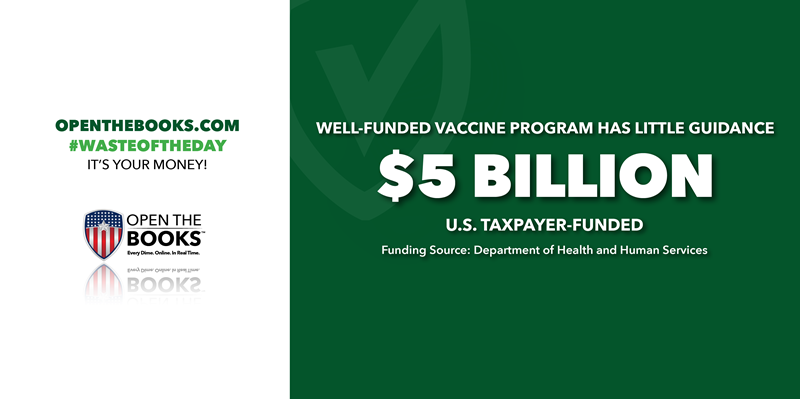
The Biden administration is giving $5 billion to a new vaccine grant program to produce updated Covid vaccines, but vaccine manufacturers aren’t sure how to navigate the bureaucratic requirements and regulatory uncertainty, according to The New York Times.
The grant program, known as Project NexGen, is funded by the Department of Health and Human Services. HHS says the program, “will accelerate and streamline the rapid development of the next generation of vaccines and treatments through public-private collaborations.” Officials hope the new vaccines will more effectively protect against newer Covid variants.
Despite the availability of funds, private manufacturers are frustrated by the program’s lack of information and guidance.
The Times reported that vaccine manufactures are unsure whether they qualify for the funding. It’s also unclear whether the clinical trials the new program is funding will be sufficient to gain regulatory approval. One virologist said of the program, “There’s not the money, there’s not the infrastructure, there’s not the support,” according to the Times.
The Biden administration is hopeful the new vaccines will be available in 2024, but most scientists have said development of a updated vaccines will take at least several years.
The better solution to spur innovation is to cut red tape, and streamline the confusing approval processes for vaccines, like was done under Operation Warp Speed in 2020. Many experts told the Times that the approval processes need to be reformed first to see breakthroughs in vaccine development.
This is yet another example of how the thoughtless implementation of a program will yield poor results, regardless of how much money is thrown at the problem. Until federal regulators simplify the confusing regulatory landscape, no amount of tax dollars will fix it.
Throwback Thursday: NSF Spent $50K Studying Congressional Faces
July 20, 2023
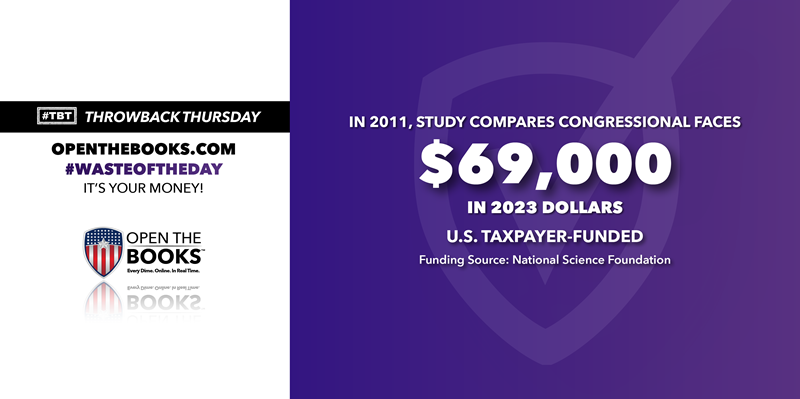
Throwback Thursday!
In 2011, the National Science Foundation granted researchers at UCLA $50,000 — $69,000 in 2023 dollars — to study the faces of members of Congress to determine if Republicans and Democrats look different
A UCLA press release explained that researchers fed a computer pictures of 434 members of the 111th House of Representatives, which analyzed features like the shape of the jaw, the location of eyebrows, and the placement of cheek bones. This data allowed researchers to score different faces as more traditionally masculine or feminine.
Researchers founds that “Female politicians with stereotypically feminine facial features are more likely to be Republican than Democrat, and the correlation increases the more conservative the lawmaker's voting record.” Additionally, they noted “Female politicians with less stereotypically feminine facial features were more likely to be Democrats, and the more liberal their voting record.”
The findings were so strong that undergraduates in some cases were able to predict what political affiliation a congressional member had.
While these findings may be interesting or amusing, they’re hardly important to medicine or science at large. Former Sen. Jeff Flake highlighted this study as an example of waste in his report, “20 Questions: Government Studies That Will Leave You Scratching Your Head.”
The NSF defended its funding of this project, claiming the study promised to “significantly advance how we ‘see’ others.” That is hardly a compelling defense of spending $50,000.
Government waste is a perpetual threat to economic efficiency and responsible spending, and lawmakers need to stay vigilant to rein in ridiculous studies like this.
Biden Rushing Out $400B for Green Energy
July 21, 2023
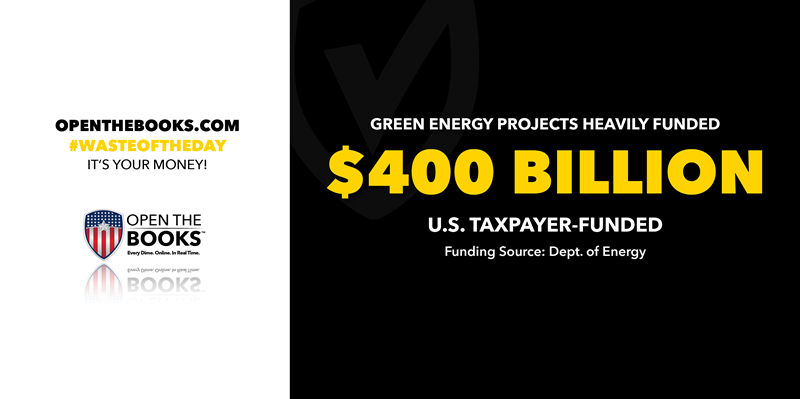
As part of the Biden administration’s commitment to combatting climate change, the Department of Energy is shelling out $400 billion for green energy projects, according to The Wall Street Journal.
According to The Journal, the Energy Department’s loan programs office is funding the investments, which range from unproven technologies from startups to massive projects from mega corporations. The Inflation Reduction Act of 2022 increased the office’s lending capacity by 10 times its previous authority, giving it a pile of cash at least 20 times as big as most private green energy investment funds.
Director Jigar Shah is eager to use his formidable war chest, and proactively reaches out to companies to offer loans and financing for green energy projects. For example, Ford’s electric battery venture received $9.2 billion in loans, while battery startup Kore Power received $850 million to build a manufacturing facility.
Shah already has 150 companies asking for $127.7 billion from his office, but that has hardly made a dent in his stockpile, so, according to The Journal, he “has begun writing bigger checks.”
His $9.2 billion to Ford was the largest check ever written by the office, substantially bigger than the $5.9 billion Ford borrowed from the office during the 2009 Great Recession.
Despite the excitement around these investments, the loan office has a history of bad deals. It infamously wasted $535 million on a failed solar panel company called Solyndra. Now, some staff are worried the funding being awarded now is just as risky, according to The Journal.
These questionable projects include $1 billion for Monolith, which failed to meet basic requirements to show its process worked at scale, and $102 million for Syrah, a company reliant on a Mozambiquan mine that suffered terrorist attacks on its critical raw materials.
All projects that receive taxpayer funds should undergo a rigorous review process to ensure the funds are necessary and will be used wisely, and pushing out extra money to questionable programs all but guarantees waste.
The #WasteOfTheDay is presented by the forensic auditors at OpenTheBooks.com.